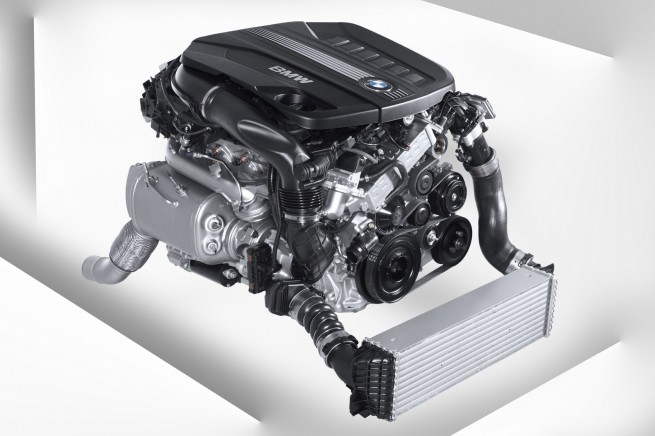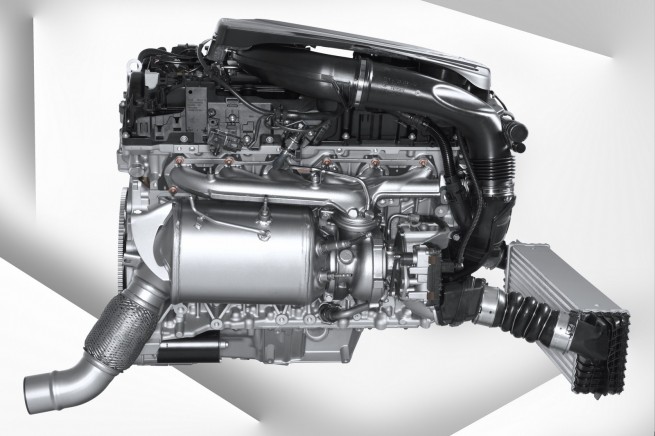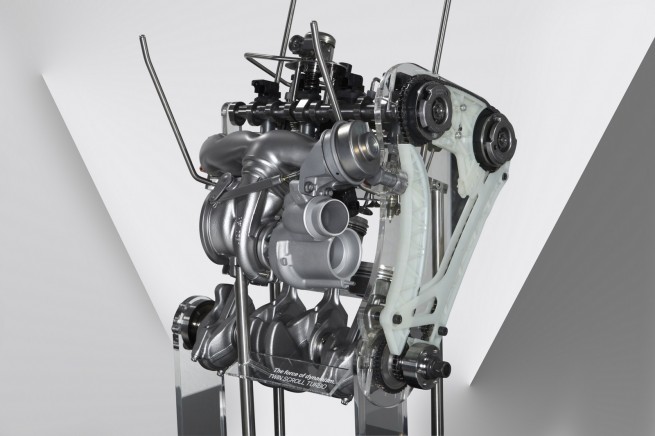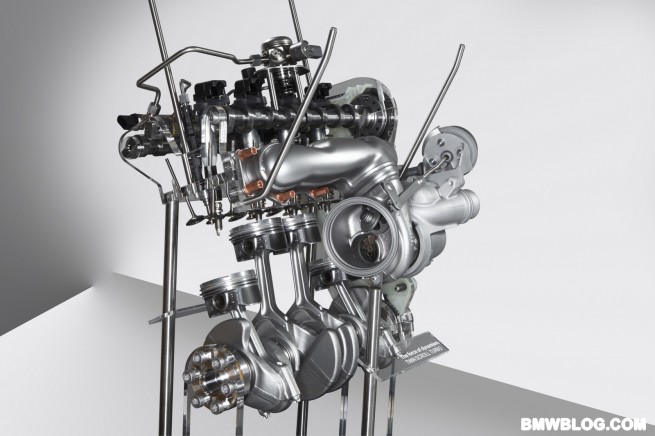The New BMW Engines Family
Sustainability past commonality: the new BMW Group Efficient Dynamics family of engines.
With the development and product of future bulldoze units with six, iv and three cylinders, the BMW Group continues to bank on its independence too equally on the utilize of innovative technologies in the largest possible number of vehicle concepts. The new BMW Group Efficient Dynamics family of engines uses a standardised set of design principles and a significantly increased number of mutual components for both petrol and diesel engines.
The new BMW modular engine organisation is based upon the in-line engine principle too as on the BMW TwinPower Turbo technology packet. The loftier degree of commonality inside the BMW modular engine organisation strengthens sustainability in terms of both economic system and ecology.
 The new BMW modular engine organisation allows 3, four and six-cylinder power units to be adult, with various power outputs. This scalability lays the groundwork for a wide functioning spectrum and thus for various, worldwide awarding in vehicle concepts within the BMW Group. Independent of the number of cylinders, the type of engine and power output, each power unit meets the excellent standards which define engine development in the BMW Group in terms of efficiency, power delivery and running smoothness.
The new BMW modular engine organisation allows 3, four and six-cylinder power units to be adult, with various power outputs. This scalability lays the groundwork for a wide functioning spectrum and thus for various, worldwide awarding in vehicle concepts within the BMW Group. Independent of the number of cylinders, the type of engine and power output, each power unit meets the excellent standards which define engine development in the BMW Group in terms of efficiency, power delivery and running smoothness.
These petrol and diesel engines of the future with three, 4 and six cylinders will be manufactured with a maximum degree of flexibility at the BMW facilities in Munich and Steyr. Past 2012, the BMW Grouping will have invested well-nigh 300 meg Euros in at both production locations.
Today, the BMW Group already employs meaning efficiency-optimising technologies on engines of different size and power output. For case, all diesel engines available for current BMW and MINI models are equipped with an aluminium crankcase, turbocharging and Common Rail direct injection.

Moreover, BMW TwinPower Turbo technology is used on both four and six-cylinder diesel engines. BMW TwinPower Turbo engineering science for petrol engines is also already being employed for the first fourth dimension in a consequent configuration on four and six-cylinder power units. The applied science package comprises optimised air supply by ways of VALVETRONIC, efficient combustion through precise fuel-air mixture supply facilitated past Loftier Precision Injection, every bit well every bit state-of-the-art turbo engineering science.
The new BMW Group Efficient Dynamics engine family featuring BMW TwinPower Turbo technology.
Within the BMW Group Efficient Dynamics engine family, BMW TwinPower Turbo technology constitutes a common characteristic of all four and half-dozen-cylinder petrol and diesel engines and is also designed for use on futurity three-cylinder engines. BMW TwinPower Turbo comprises variable ventilation of the engine, optimised fuel combustion and the most constructive supercharging engineering for each specific power unit. Based on the BMW TwinPower Turbo technology parcel, various power units are available within the BMW engine range that can be utilised worldwide co-ordinate to the Efficient Dynamics strategy and beyond the unabridged spectrum of the model portfolio.

The highest level of technology is the criterion, maximum synergy the target.
Through consequent development of components that tin be employed not only for unlike size engines only also both for petrol and diesel fuel power units, the BMW Group increases the so-called degree of commonality within the engine portfolio through the use of a modular engine concept. The technology bundle BMW TwinPower Turbo is the criterion for all ability units and is designed to run across the demands of exceptionally powerful engines.
Using maximum efficiency in the development and manufacturing process, the best possible technical solutions for the entire spectrum of the engine range can be made bachelor. Therefore, irrespective of the number of cylinders, combustion process and power output, each engine conforms to the excellent standards defined past BMW Grouping engine designers with regard to efficiency, power development and running smoothness.
The BMW modular engine system strengthens economic and ecological sustainability.
A concordant architecture and a consistent design principle for all future petrol and diesel fuel engines featuring three, iv or six cylinders serve as the basis for increased commonality inside the drive portfolio. The modular engine concept arising from this is the effect of BMW drivetrain development, with the engines also being built by BMW. Thanks to this approach, a farther contribution towards the strengthening of the BMW Group'due south independence is being made.
BMW modular engine organization guarantees significant advancements both in the economical sustainability for the company in terms of development and production likewise as in ecological sustainability with regard to the fuel and emission levels of hereafter models. Therefore, it constitutes a crucial pillar for the successful continuation of the BMW Grouping Efficient Dynamics strategy.
Perfect thermodynamics, in-line principle as a common ground.

The in-line engine structure principle forms the common basis for the basic variant of all petrol and diesel engines. For modular engine assembly a cylinder displacement of around 500 cubic centimetres per combustion bedchamber is defined, with which optimum thermodynamics can be achieved. As a result of this principle, the displacement of each engine is directly proportional to the number of combustion chambers.
Development and product efficiency through communal components and common interfaces for vehicle integration.
In add-on, the constructional commonalities are related, inter alia, to cylinder spacing, the crankcase and residuum shaft concept as well as the position of the drive chain on the flywheel side. Furthermore, petrol and diesel engines can also be equipped with standardised oil sumps including vacuum pump and constructional commonality tin also be achieved through belt drive configuration, the arrangement of ancillary components and positioning of the exhaust gas later-handling systems in the proximity of the engine. The proportion of all identical or communal components utilised across the entire engine range increases to upward to 60 percent.
Moreover, all three and four-cylinder petrol and diesel fuel engines developed according to this principle offer the prerequisites for both longitudinal and transverse installation in future BMW or MINI models respectively. Additional efficiency in development and production is achieved through standardised interfaces between power units originating from the BMW modular engine system and each specific vehicle.
The scalable modular engine system facilitates a broader performance spectrum for variegated use within the model portfolio. The new BMW modular engine concept offers the possibility to develop three, four and six-cylinder engines with varying ability output levels. This scalability creates the preconditions for a wide performance spectrum and, simultaneously, for a multitude of uses inside BMW Group vehicle concepts.
As the components used on engines of varying size and power output are produced in significantly college quantities, it will exist possible too in the future to accomplish the desired diversity within the drive portfolio with considerably optimised toll efficiency. As a whole, a newly introduced engine already achieves the profitability necessary for a long-term economical production strategy with a quarter of the quantity previously required. Thanks to the BMW modular engine system the BMW Grouping produces significantly higher quantities of individual components along with the associated economies of scale.
Moreover, the high degree of commonality results in a reduction in cost and effort required for the development of boosted engine variants. For instance, particularly powerful versions of an existing engine or hybrid variants for individual series can exist economical even with comparably low quantities.
[Source: BMW ]
Source: https://www.bmwblog.com/2011/04/07/the-new-bmw-engines-family/
0 Response to "The New BMW Engines Family"
Post a Comment